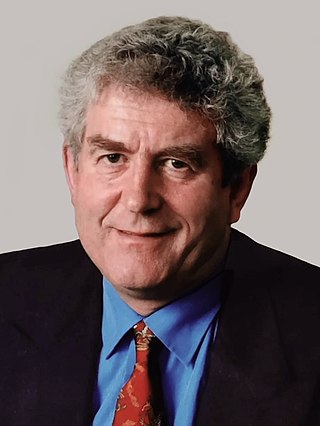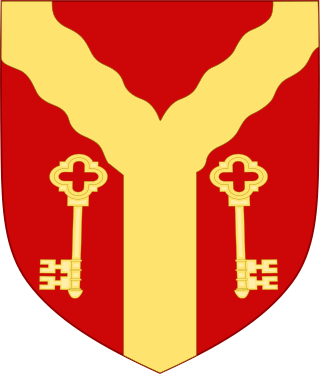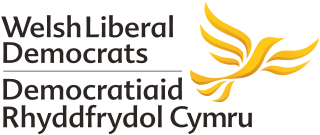This article has multiple issues. Please help improve it or discuss these issues on the talk page . (Learn how and when to remove these template messages)
|
Russell Deacon works in governance and policy.
This article has multiple issues. Please help improve it or discuss these issues on the talk page . (Learn how and when to remove these template messages)
|
Russell Deacon works in governance and policy.
Deacon was born in Newbury, Berkshire in 1966. He has lived in the Rhondda Valley, Pontypridd in the 35 years he has lived in Wales. He has lived for many years in Caerphilly.
Deacon went to Denefield School, then to Reading and Aylesbury Colleges. He studied Business Studies, Accountancy and Law at vocational and A level. He went onto work for a number of major companies in a finance role, including Equitable Life, Granada TV and Medicare. In 1987 he spent a period living in Memphis, Tennessee and has been a regular visitor to the United States in the following decades. In the same year as he lived in Memphis, Deacon became an undergraduate on the BA (Hons) Public Administration degree programme in the University Glamorgan. This was a four-year degree and he spent the sandwich year working in the European Affairs Division of the Welsh Office. After graduating from the University of Glamorgan he spent a further year undertaking postgraduate study at Cardiff University. In 1999 he was also awarded a PhD from the University of Glamorgan on 'The Welsh Office and the Policy Process'. [1]
Deacon's professional career started in 1992 at University of Wales Institute, Cardiff (UWIC) when he was employed to teach public affairs to the National Council for Journalists professional training courses. He served in the Business School for the next 8 years finishing as the director of research on the MBA programme. In 2001 he helped start the Humanities courses at UWIC in the School of Lifelong Learning. The first cohort had around 45 students, the degree programmes now, in the School of Education, have around 350 students connected with the Humanities pathways. In 2006 he became Head of the newly formed Department of Humanities. Then in 2008 he became the Acting Director of Research for the School of Education. In April 2010 he was awarded a personal chair by UWIC and made his inaugural lecture on Politics and Humour in February 2011. Deacon left UWIC in July 2011 and from the Autumn of 2011 he worked with the Department of History at the University of Wales Trinity St Davids [2] before starting lecturing at Swansea University.
Deacon was previously associated with the running of the ERASMUS programme in UWIC. In this respect he has presented on the subject at academic conferences and published in an academic journal. [3] Deacon currently is a lecturer at Coleg Gwent where he lectures on Politics and History .
Deacon has also had a long period directly involved in politics specifically for the Welsh Liberal Democrats. In 1992 and 1997 he was the agent in the Rhondda Valley, the later time for Dr Rodney Berman the ex-leader of Cardiff City Council. Although he stood for council office 15 times he was only successful twice, he served on Van Community Council as the only elected Liberal Democrat in the Caerphilly County Borough area. [4] In the 1997 referendum Deacon served on the Board of the Yes for Wales Campaign, directed by Leighton Andrews. On the night of the referendum itself he provided the expert media coverage for ITN. [5] In 1998 he worked for a while in Westminster in support of the Welsh Liberal Democrats during the drafting of the Government of Wales Act 1998 under the late Lord Richard Livsey. In 1999 he was seconded to the National Assembly for Wales for one year to help set up the administrative structures. There he worked directly to Lord German, the then leader of the Welsh Liberal Democrats. [6]
Deacon has made numerous media appearances for BBC programmes such as AM/PM, the Politics Show, television series such as Coming Home and The History of Wales, as well as radio programmes on Radios 2, 4 and Radio Wales. [7] Deacon became the Chair of the Campaign for a Welsh Parliament between 2005–2008. He also serves on the Boards of the National Library of Wales Political Archives, the Welsh Council of the European Movement, History Research Wales and the Liberal History Society. In addition Deacon is the convenor of the British Liberal Political Studies Group, part of the Political Studies Association. [8]
Deacon was an advisor to the Electoral Reform Society on the referendum in May 2011 on the Alternative Vote. He has appeared as an expert witness before many Westminster and Welsh Assembly Commissions on electoral and political reform. In recent years Deacon has also advised the WJEC and Qualifications Wales on the syllabus for the Welsh AS and A level programmes in Politics
Deacon has also been a key note speaker at the Lloyd George Society, [9] the WJEC politic students' conference and at a number of European Universities including the Ghent University, Johan Gutenberg University in Mainz and the University of Plovdiv in Bulgaria. In 2010 Deacon was made a royal fellow when he was elected to the Royal Historical Society.
Deacon has developed his research in both contemporary politics and history and has therefore published numerous articles and books related to this. In particular he has written on the topics of devolution and the history of the Liberal Party in Wales and the UK.
Deacon has written around 80 articles, book chapters and books. The main books he had written in the last decade are:
Devolved Great Britain: the New Governance of England, Scotland and Wales, with Dylan Griffiths and Peter Lynch, Sheffield Hallam University Press, 2000
‘God Bless the Prince of Wales’, with Steve Belzak, Centre for Reform in Wales, 2000
The Welsh Office and the Policy Process (1964–1999), Welsh Academic Press, 2002
Devolution in Britain Today, Manchester University Press, 2006
Devolved Great Britain: the New Governance of England, Scotland and Wales with Alan Sandry, Edinburgh University Press, 2007
Devolution in Great Britain, Edinburgh University Press, 2012
The Welsh Liberals: The History of the Liberal and Liberal Democrat parties in Wales, Welsh Academic Press, 2014 [10]
The Government and Politics of Wales, Edinburgh University Press, 2018 [11]

Until 1974, Glamorgan, or sometimes Glamorganshire, was an administrative county in the south of Wales, and later classed as one of the thirteen historic counties of Wales. Originally an early medieval petty kingdom of varying boundaries known in Welsh as Morgannwg, which was then invaded and taken over by the Normans as the Lordship of Glamorgan. The area that became known as Glamorgan was both a rural, pastoral area, and a conflict point between the Norman lords and the Welsh princes. It was defined by a large concentration of castles.
Plaid Cymru is a centre-left to left-wing, Welsh nationalist political party in Wales, committed to Welsh independence from the United Kingdom.

Hywel Rhodri Morgan was a Welsh Labour politician who was the First Minister of Wales and the Leader of Welsh Labour from 2000 to 2009. He was also the Assembly Member for Cardiff West from 1999 to 2011 and the Member of Parliament for Cardiff West from 1987 to 2001. He remains the longest-serving First Minister of Wales, having served in the position for 9 years and 304 days. He was Chancellor of Swansea University from 2011 until his death in 2017.

Ronald Davies is a retired Welsh politician, former Secretary of State for Wales, former Member of Parliament and former member of the Welsh Assembly. He describes himself as a politician belonging to the "traditional left" who had "spent his life looking for a socialist progressive party". He was a member of the Labour Party, and then of Forward Wales (2004-2009); he was subsequently an independent candidate and eventually joined Plaid Cymru in 2010.

Welsh nationalism emphasises and celebrates the distinctiveness of Welsh culture and Wales as a nation or country. Welsh nationalism may also include calls for further autonomy or self-determination, which includes Welsh devolution, meaning increased powers for the Senedd, or full Welsh independence.

Cardiff Metropolitan University, formerly University of Wales Institute, Cardiff and commonly referred to as Cardiff Met, is a university located in the city of Cardiff.

The South Wales Valleys are a group of industrialised peri-urban valleys in South Wales. Most of the valleys run north–south, roughly parallel to each other. Commonly referred to as "The Valleys", they stretch from Carmarthenshire in the west to Monmouthshire in the east; to the edge of the pastoral country of the Vale of Glamorgan and the coastal plain near the cities of Swansea, Cardiff, and Newport.

Politics in Wales forms a distinctive polity in the wider politics of the United Kingdom, with Wales as one of the four constituent countries of the United Kingdom (UK).

Michael James German, Baron German, OBE is a British politician, serving currently as a member of the House of Lords and formerly as a member of the National Assembly for Wales for the South Wales East region. He was leader of the Welsh Liberal Democrats from 2007 to 2008. In 1996, he was awarded an OBE for his public and political service.

Rodney Simon Berman OBE is a Liberal Democrat politician, currently a councillor for the Penylan ward of Cardiff. He was formerly a councillor for Plasnewydd ward, and was also leader of Cardiff Council between 2004 and 2012.

Alfred Thomas, 1st Baron Pontypridd, was a Welsh Liberal Party politician, who served as MP for East Glamorganshire from 1885 until 1910, when he was elevated to the peerage as Lord Pontypridd.

Yes for Wales! is the name used to refer to two separate cross-party pro-devolution groups that were formed in the lead up to the 1997 and the 2011 devolution referendums held in Wales.
Welsh Labour, formerly known as the Labour Party in Wales, is an autonomous section of the United Kingdom Labour Party in Wales and the largest party in modern Welsh politics. Welsh Labour and its forebears have won a plurality of the Welsh vote at every UK general election since 1922, every Assembly and Senedd election since 1999, and all elections to the European Parliament in the period 1979–2004 and in 2014. Welsh Labour holds 22 of the 40 Welsh seats in the UK Parliament, 30 of the 60 seats in the Welsh Senedd and 576 of the 1,264 councillors in principal local authorities including overall control of 10 of the 22 principal local authorities.

Leighton Andrews is an academic and former Welsh Labour politician. He was the National Assembly for Wales member for Rhondda from 2003 until 2016. He was Minister for Children, Education & Lifelong Learning from 2009 to 2011, then Minister for Education and Skills in the Welsh Government until his resignation on 25 June 2013 after an alleged conflict between his own departmental policy and his active campaigning to save a school in his constituency. In September 2014 he returned to the government as Minister for Public Services.

The Welsh Liberal Democrats are a branch of the United Kingdom Liberal Democrats that operates in Wales. The party is led by Jane Dodds, who served as MP for Brecon and Radnorshire from August to December 2019, and MS for Mid and West Wales since May 2021. The party currently has 1 elected member in the Senedd and no Welsh seats in the UK House of Commons, but does have several members of the House of Lords. The party had 69 local councilors serving in principal authorities as of the 2022 local authority elections, up 10 from 2017.

The modern history of Wales starts in 1800 and continues until the present day. In the 19th century, South Wales became heavily industrialised with ironworks; this, along with the spread of coal mining to the Cynon and Rhondda valleys from the 1840s, led to an increase in population. The social effects of industrialisation resulted in armed uprisings against the mainly English owners. Socialism developed in South Wales in the latter part of the century, accompanied by the increasing politicisation of religious Nonconformism. The first Labour Party MP, Keir Hardie, was elected as a junior member for the Welsh constituency of Merthyr Tydfil and Aberdare in 1900.

Richard Wyn Jones FAcSS FLSW is a Welsh academic at Cardiff University, where he is Director of Cardiff University's Wales Governance Centre and Dean of Public Affairs. Jones was a former Professor of Welsh Politics at Cardiff as well as the founding Director of the Institute of Welsh Politics and Critical Security Studies at Aberystwyth University.

Unionism in Wales is the political view that supports a political union between Wales and the other countries of the United Kingdom. As well as the current state of the UK, unionism may also include support for Federalism in the United Kingdom and a United Kingdom Confederation.

Wales has traditionally been divided into a number of ambiguous and ill-defined areas described as regions, reflecting historical, geographical, administrative, cultural and electoral boundaries within the country. Presently, the most common form of division of Wales into "regions" has been using cardinal and intercardinal references: north or south-west for example. None of the variously described "regions" have official status or defined boundaries; neither is there a fixed number of regions. Various organisations use different regions and combinations of regions for their individual purposes. This includes devolved institutions, such as Visit Wales, Natural Resources Wales, and the Welsh Government itself, using different sets of Wales' regions. Wales is most commonly sub-divided into between two and four regions, with a North–South divide, and North, Mid, South East and South West division being common. This article lists the various terms applied to be the "regions of Wales" and the regions used by various organisations.

Welsh devolution is the transfer of legislative power for self-governance to Wales by the Government of the United Kingdom.